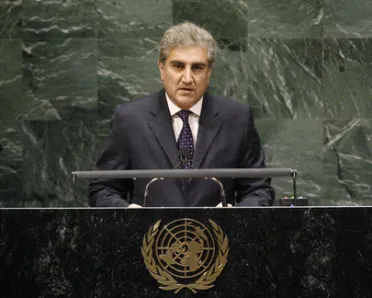Statement
Statement summary
MAKHDOOM SHAH MEHMOOD QURESHI, Minister for Foreign Affairs of Pakistan, said that the recent flash floods in his country — the worst in living memory — had seen precious lives lost, millions of acres of crops washed away, and livelihoods lost. Pakistan was grateful to the United Nations, its development partners and others for supporting rescue and relief efforts. The Government was determined to rebuild a better and vibrant Pakistan in a transparent and accountable manner; “the resilience of our people should enable us to achieve this objective”.
Pakistan supported a comprehensive reform of the Security Council to make it more representative, equitable, transparent and accountable, guided by the principles of equality and democracy, he said. A consensus solution should correspond with the interests of all Member States, particularly small and medium States, developing countries and Africa. On terrorism, Pakistan had achieved important successes, but at a heavy cost, with more than 20,000 innocent civilians falling victim to terrorism, more than 2,500 members of the security forces killed and material loses of nearly $50 billion. Pakistan would persist in its efforts to eliminate terrorism, but it was essential to address the root causes of terrorism, often found in poverty, deprivation, injustices and oppression. Terrorism recognized no borders, nor did it have a religion or creed. “We cannot accept the stereotyping of Muslims as terrorists”; terrorism was a complete antithesis to Islam’s outlook and values.
Jammu and Kashmir was among the oldest disputes on the agenda of the United Nations, he said. It was a dispute about the right of self-determination by the Kashmiri people through a free, fair and impartial plebiscite under United Nations auspices. He strongly condemned the brutality of the past two months, in which more than 100 Kashmiris had been killed by Indian security forces. Pakistan was willing to engage India in a comprehensive dialogue to normalize bilateral relations and amicably resolve all outstanding issues, including Jammu and Kashmir. A peaceful resolution of the Kashmir dispute would help create durable peace and stability in South Asia. On Afghanistan, he said Pakistan had been hosting the largest concentration of refugees anywhere for more than 30 years; it continued to host its Afghan brothers as a moral and humanitarian duty. No country had suffered more than Pakistan from the consequences of the conflict in Afghanistan. “The time has come to turn Afghanistan from the centre stage of proxy wars, interference and confrontation into a hub for international cooperation and development.” Restoring societal equilibrium was an Afghan responsibility that could not be imposed externally. Pakistan supported all efforts at national reconciliation that was Afghan-owned and Afghan-led.
Disarmament and non-proliferation should be pursued in an equitable manner, the Foreign Minister said. Pakistan has consistently pursued a policy of conventional and nuclear restraint, along with conflict resolution in South Asia; a strategic restraint regime would be an important way to promote regional peace, stability and security. Pakistan was low on the list of greenhouse gas emitters, yet climate change was causing irrevocable damage, becoming a reality for 170 million Pakistanis. Extreme vulnerability to climate change complicated the scenario for Pakistan’s post-flood reconstruction. It was hoped that the United Nations Framework Convention on Climate Change Conference in Cancun would define a pathway to agreement at an early date.
Full statement
Read the full statement, in PDF format.
Photo

Previous sessions
Access the statements from previous sessions.
